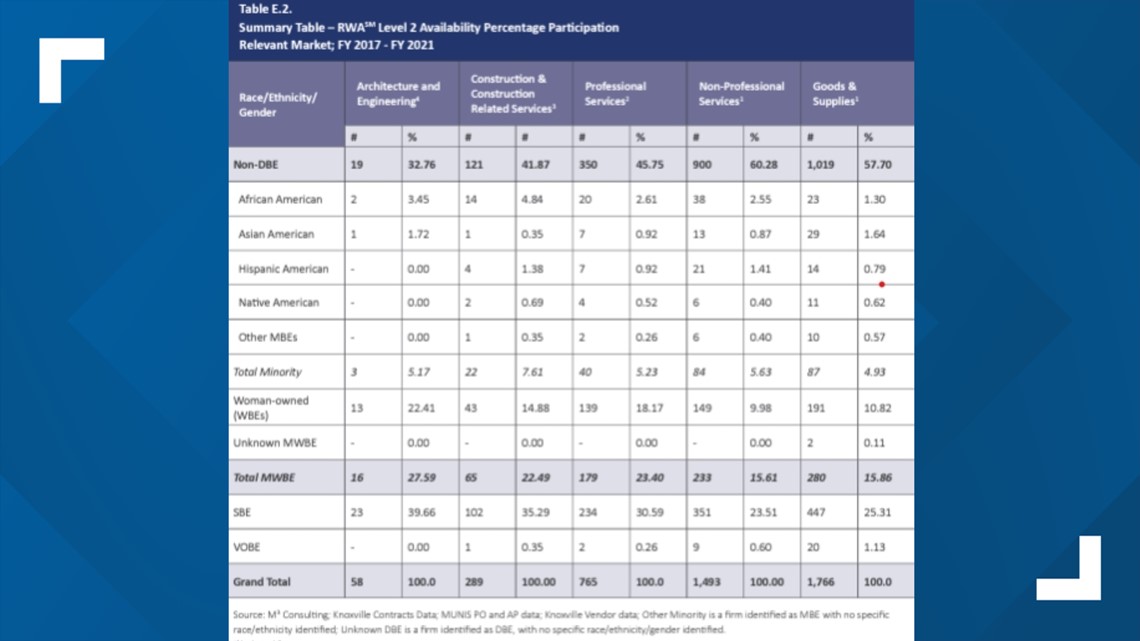KNOXVILLE, Tenn. — The Knoxville City Council met on Monday to discuss the findings of a report meant to find ways leaders could help small businesses compete for city contracts.
The comprehensive Disparity Study interviewed more than 50 owners of "Disadvantaged Business Enterprises" to collect information about the barriers they face when trying to do business in Knoxville. More than 3,280 others were invited to participate in surveys.
Miller3 Consulting conducted the Disparity Study. City leaders said it is the first top-to-bottom Disparity Study in 25 years. The results of the study can also be used to fulfill requirements from the Supreme Court for the city to implement race-conscious and gender-conscious techniques in terms of economic policy.
According to the study, around 58 firms are available for architectural and engineering work. Of those 58 firms, 16 are owned by minorities and women. Firms owned by African-Americans make up around 3% of all the firms available to the city of Knoxville.
It also said there are around 289 available construction companies for work Knoxville needs to be done. Of those, around 15% are owned by women and around 5% are owned by African-Americans. Hispanic Americans owned around 1% of all the firms, the study said.
Around 765 firms are available to the city for professional services. Around 18% of them are owned by women, and around 2.6% are owned by African-Americans — the most of any other minority group.


Knoxville most often utilized minority-owned businesses in the sector of nonprofessional services, with around 20% of payments, purchase orders and contract dollars the city spent in that sector going towards those businesses, according to the study. Around 5% of contract dollars went to minority-owned businesses in the goods and services sector — the second-highest sector that received money from the city.
"COK (City of Knoxville) staff indicated that many departments engage repeatedly with firms they’ve previously worked with. The enterprisewide culture does not incentivize staff with buying authority, to periodically look for new entrants or DBE providers into a product or service area that a department regularly procures. This has resulted in the same companies being awarded the same informal contracting opportunities where staff with buying authority have greater discretion," the study said.
Anecdotally, the study said they most small, minority and women business owners agreed that Knoxville's outreach activities were informative and supportive, but did not have a substantial impact.
"The DBE firms interviewed stated that limited-to-no access to COK’s “Buyers/Decision Makers” prevented them from connecting, fostering relationships, and promoting their capabilities. As a result, those interviewed believe that the non-DBE firms who have previous access, relationships, and a positive past performance track record with COK’s Buyers/DecisionMakers are the firms who continue to receive repeat contacts for contract awards," the study said.
It also said among interviewees there was as strong belief that pursuing work with the city was "a waste of time," and it said business owners did not believe Knoxville leaders were serious about implementing new strategies to eliminate barriers. At the same time, the report said contractors reported frustration in finding DBE firms and connecting with them.
The report said one of the best ways to address contractors' concerns was to implement a mentor-protege program between contractors and business owners. It also made several specific recommendations on how the city could utilize and find more minority-owned businesses.
It recommended the city establish clear race-conscious and gender-conscious goals to improve how often minority-owned businesses are utilized. It also recommended Knoxville conduct a culture audit to help the city move toward and organizational culture that "will more readily support the Mayor and City Council's vision and mission, as well as a more inclusive procurement environment."

